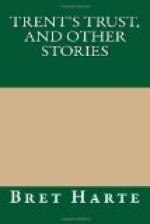Mr. Hamlin glanced at the children. “It’s Melindy looking for us,” said John Wesley. But they did not move. At which Mr. Hamlin called out faintly but cheerfully, “They’re here, all right.”
Again the voice arose with still more marked and lofty distinctness, “John Wesley and Mary Em-me-line.” It seemed to Mr. Hamlin that human accents could not convey a more significant and elevated ignoring of some implied impropriety in his invitation. He was for a moment crushed.
But he only said to his little friends with a smile, “You’d better go now and we’ll have that story later.”
“Affer beckus?” suggested Mary Emmeline.
“In the woods,” added John Wesley.
Mr. Hamlin nodded blandly. The children trotted to the door. It closed upon them and Miss Bird’s parting admonition, loud enough for Mr. Hamlin to hear, “No more freedoms, no more intrudings, you hear.”
The older culprit, Hamlin, retreated luxuriously under his blankets, but presently another new sensation came over him—absolutely, hunger. Perhaps it was the child’s allusion to “beckus,” but he found himself wondering when it would be ready. This anxiety was soon relieved by the appearance of his host himself bearing a tray, possibly in deference to Miss Bird’s sense of propriety. It appeared also that Dr. Duchesne had previously given suitable directions for his diet, and Mr. Hamlin found his repast simple but enjoyable. Always playfully or ironically polite to strangers, he thanked his host and said he had slept splendidly.
“It’s this yer ‘ozone’ in the air that Dr. Duchesne talks about,” said Seth complacently.
“I am inclined to think it is also those texts,” said Mr. Hamlin gravely, as he indicated them on the wall. “You see they reminded me of church and my boyhood’s slumbers there. I have never slept so peacefully since.” Seth’s face brightened so interestedly at what he believed to be a suggestion of his guest’s conversion that Mr. Hamlin was fain to change the subject. When his host had withdrawn he proceeded to dress himself, but here became conscious of his weakness and was obliged to sit down. In one of those enforced rests he chanced to be near the window, and for the first time looked on the environs of his place of exile. For a moment he was staggered. Everything seemed to pitch downward from the rocky outcrop on which the rambling house and farm sheds stood. Even the great pines around it swept downward like a green wave, to rise again in enormous billows as far as the eye could reach. He could count a dozen of their tumbled crests following each other on their way to the distant plain. In some vague point of that shimmering horizon of heat and dust was the spot he came from the preceding night. Yet the recollection of it and his feverish past seemed to confuse him, and he turned his eyes gladly away.




